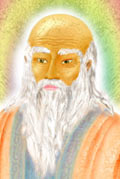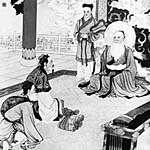
Lao-tzu - Biography and Doctrine
![]()
|
Lao-tzu by Eskild Tjalve (click the picture to enlarge) |
Lao-tzu surname was Li; as for his real name, Erh (meaning ear), which gave place after his death to Tan, which translates "long ears". Hence, in Legge's opinion, one may conclude that this name was attributed to him because of a certain peculiarity of his ears.
Lao-tzu was born in the state of Ch'u, which had extended beyond its usual boundaries, and his birthplace was in what is known nowadays as Ho-nan province. He was a curator at the Royal Library by 517 B.C., when Confucius visited the capital, and they met each other.
Confucius Meets Lao-tzu
According to Ch'ien, Confucius visited Lo-yang in order to talk with Lao on ceremonies (li). Lao-tzu is reported to have said to Confucius:
The men about whom you talk are dead, and their bones are mouldered to dust; only their words are left. Moreover, when the superior man gets his opportunity, he mounts aloft; but when the time is against him, he is carried along by the force of circumstances. I have heard that a good merchant, though he have rich treasures safely stored, appears as if he were poor; and that the superior man, though his virtue be complete, is yet to outward seeming stupid. Put away your proud air and many desires, your insinuating habit and wild will. They are of no advantage to you; this is all I have to tell you.
Confucius meets Lao-tzu |
I know how birds can fly, fishes swim, and animals run. But the runner may be snared, the swimmer hooked, and the flyer shot by the arrow. But there is the dragon: I cannot tell how he mounts on the wind through the clouds, and rises to heaven. Today I have seen Lao-tzu, and can only compare him to the dragon.
In Legge's opinion, it is in this speech of Confucius' that the name "Lao-tzu" given to the father of Taoism derives from. The meaning of this name is the "Old Philosopher" or the "Old Gentleman". (2) The reason is simple: when he met Lao, Confucius was only 35 years old, whereas Lao was 88!
Lao-tzu's Doctrine
Ch'ien also adds more details regarding the old master: "Lao-tzu cultivated the Tao and its attributes, the chief aim of his studies being how to keep himself concealed and remain unknown."
Finally, Ch'ien traces Lao-tzu's descendants until 1st century B.C. and concludes:
Those who attach themselves to the doctrine of Lao-tzu condemn that of the Literati, and the Literati on their part condemn Lao-tzu, verifying the saying, "Parties whose principles are different cannot take counsel together." Li R [Lao-tzu] taught that by doing nothing others are as a matter of course transformed, and that rectification in the same way ensues from being pure and still.
These notes are all that we have about Lao-tzu's life and work. There's no indication concerning the sage's journey to the north: he simply gets out of our sight the minute he passes the boundary of the state of Ch'u.
At Lao-tzu's Death
Surprisingly enough, a story from Chuang-tzu still offers us details about Lao-tzu's death. The funerals of the master are described here, with many grieving disciples. Nonetheless - Legge concludes - this narration might be just another of Chuang-tzu's fancies: "to give him the opportunity of setting forth what, according to his ideal of it, the life of a Taoist master should be, and how even Lao-tzu himself fell short of it"
Thư Viện 1 2 3 4 5
Credit to www.Taopage.org/index

